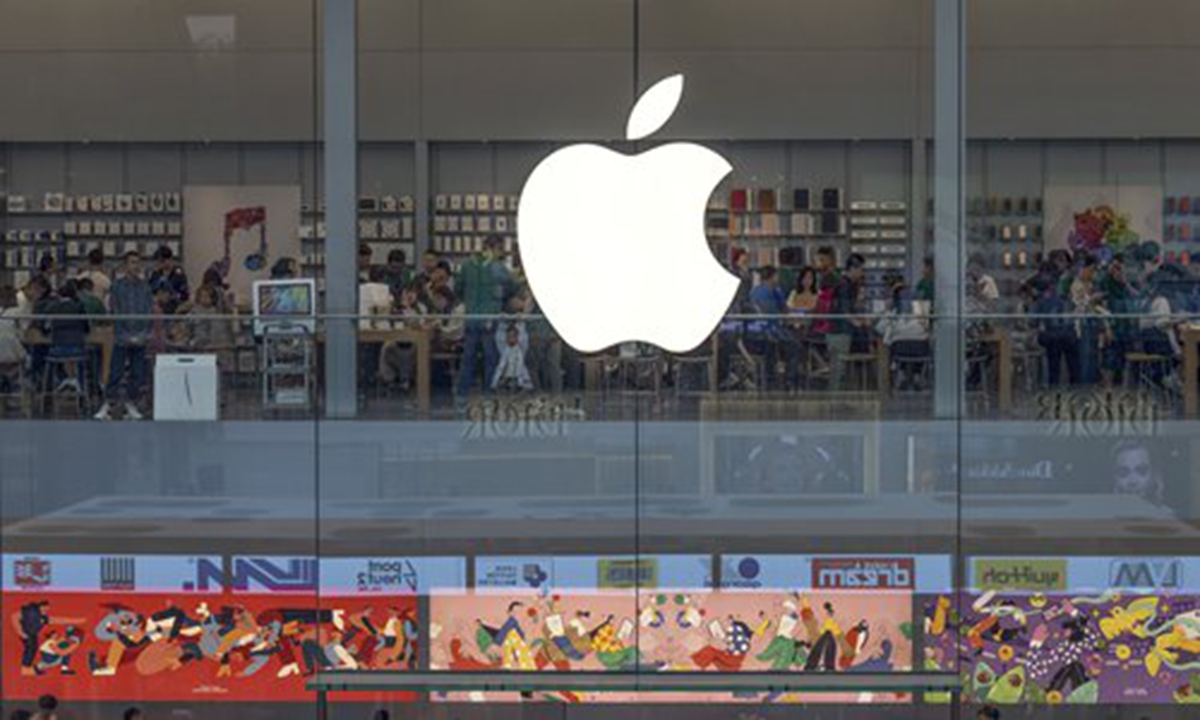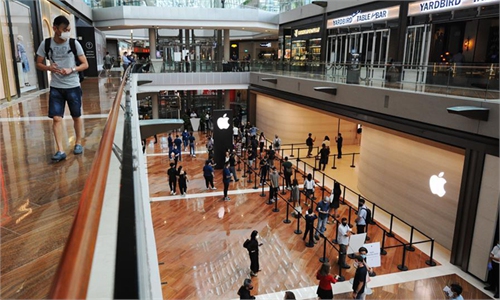Shares of supply chain companies enter uncharted waters as Apple launches underwhelm Chinese consumers

An Apple store in Chengdu, Southwest China's Sichuan Province. Photo: IC
At its first product launch this year, Apple released a purple iPhone12, a new iMac in seven different colors, and an AirTag gadget to track lost items. However, compared with the hype it created before the event, its customers in China were underwhelmed with the company's speed of innovation.
"I don't see anything that's especially innovative other than the different colors," one user commented on Weibo, China's social media platform.
The latest iPhone 12, which has exactly the same configuration as the one released in October last year -- apart from its purple color -- grabbed as much attention as suspicion from Chinese consumers. By Monday afternoon, "is the purple iPhone a stupid tax" had become a top trending topic on Weibo.
The sentiment was reflected on the market reaction to Apple and the companies on its supply chain. On Tuesday, Apple's stock price dropped by more than 1.28 percent after the launch event, slashing the company's market valuation by around $29 billion.
Moreover, shares of some companies on the Apple supply chain have fallen this year. Up until the product release event on Tuesday, 22 Apple-related companies had witnessed price drops of more than 10 percent this year.
Luxshare Precision Industry, once hailed as the top company on Apple's supply chain, has seen its shares fall by more than 39 percent so far this year.
"As sales of iPhones fluctuate, being an Apple supplier is not as prestigious as it used to be," Xiang Ligang, director general of the Beijing-based Information Consumption Alliance, told the Global Times on Friday. "Many factories are taking orders from Chinese brands as well, such as Huawei and Vivo."
Apple's supply chain bolstered the valuation of many of its suppliers a few years ago, Xiang said, especially when iPhone sales started to soar from around 2010.
According to media reports, from 2010 to the end of 2017, an index of the share prices of Apple's suppliers rose as much as 1,079 percent, compared with a rise of as much as 59 percent for the Shanghai Composite Index.
However, Yan Zhanmeng, director of a mobile research firm based in Beijing, said that Apple's share in the Chinese market is undergoing "subtle changes" , as more local brands are fast catching up.
According to statistics from CINNC, a market research firm, Apple ranked fifth in China's market in January, trailing OPPO, Vivo, Xiaomi and Huawei, all of which are Chinese brands.
"Compared with Chinese brands, Apple is getting complacent about innovation, especially considering that it used to be a trail-blazer in smartphones years ago," Yan said.
Apple is also experiencing difficulties from semiconductor chips shortage caused by the COVID-19 pandemic, which disrupted Apple's supply chain. According to media reports, the shortage of chips weighed on the timely delivery of some MacBook and iPad products earlier this month.
Apple's product releases on Tuesday were highly anticipated among some Apple fans after the event was reportedly delayed from the end of March.
"I've been buying Apple products for years, and I'd still buy Apple products, but its technology advantage over other brands is narrowing," one user surnamed Shi said. "Local brands usually catch up very quickly with whatever Apple releases."


